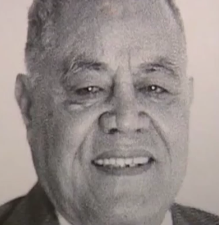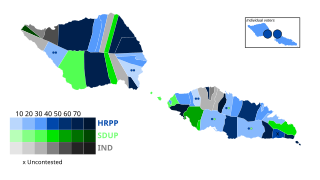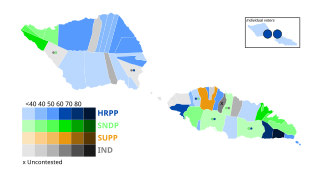
Politics of Samoa takes place in a framework of a parliamentary representative democratic state whereby the Prime Minister of Samoa is the head of government. Existing alongside the country's Western-styled political system is the fa'amatai chiefly system of socio-political governance and organisation, central to understanding Samoa's political system.

The Human Rights Protection Party is a Samoan political party. It was founded in 1979 and dominated Samoan party politics for decades thereafter, leading every government until their defeat in 2021.

SusugaTuilaʻepa Lupesoliai Neioti Aiono Saʻilele Malielegaoi is a Samoan politician and economist who served as the sixth prime minister of Samoa from 1998 to 2021. Tuilaʻepa is Samoa's longest serving prime minister and was leader of the opposition from 2021 to 2022. Since 1998, he has led the Human Rights Protection Party (HRPP). Tuilaʻepa first entered parliament in 1981 when he won a by-election to represent the electorate of Lepā. He also served as Deputy Prime Minister and Minister of Finance in the government of Prime Minister Tofilau Eti Alesana, and also held the portfolios of Tourism and Trade, Commerce & Industry.
Matatumua Maimoana (1935–2012), also known as Matatumua Maimoaga Vermeulen, was a matai, politician, Nurse and Environmentalist of Samoa. Her chief title, Matatumua, was an orator's title from the village of Faleasiu. She was a former member of parliament in Samoa and the founder of the Samoa All People's Party (SAPP), becoming the first woman to lead a political party in the country. SAPP allowed people as young as 16, regardless of gender or whether they were matai to be officers in the organisation which included village branches. She was a founding member of the Human Rights Protection Party (HRPP), which has dominated Samoan politics in the last two decades.

Tui Ātua Tupua Tamasese Tupuola Tufuga Efi is a Samoan political leader and as holder of the maximal lineage Tama-a-'āiga title of Tupua Tamasese, is one of the four paramount chiefs of Samoa. He also holds the royal pāpā title of Tui Atua.

Vaʻai Kolone was the fourth prime minister of Samoa and a founder of the Human Rights Protection Party (HRPP) in Samoa. He served as Prime Minister twice, first between 13 April and 18 September 1982, and then from 30 December 1985 until 8 April 1988.

The Christian Democratic Party (CDP) was a political party in Samoa. The party was founded in February 1985 by the supporters of former Prime Minister Tupuola Taisi Tufuga Efi. At the 1985 election the party won only 15 of 47 seats, but was able to form a coalition government in December 1985 after 11 Human Rights Protection Party MPs crossed the floor to vote against the budget of then-Prime Minister Tofilau Eti Alesana. Va'ai Kolone became Prime Minister. While apparently retaining a majority after the 1988 election, the party lost power after the defection of Tanuvasa Livigisitone to the HRPP.

General elections were held in Samoa on 31 March 2006 to determine the composition of the 14th Parliament. The main contesting parties were that of incumbent Prime Minister Tuilaʻepa Saʻilele Malielegaoi, of the Human Rights Protection Party (HRPP); and the Samoan Democratic United Party (SDUP). In addition, three other parties, the Christian Party (SCP), the Samoa Party (SP), and the Samoa Progressive Party (SPP), competed in the election. The result was a landslide victory for the HRPP, which won 33 of the 49 seats. The newly founded SDUP secured ten seats, and the remaining six were won by independents. After the election, three independents joined the HRPP, increasing the party's seat count to 36.

General elections were held in Samoa on 2 March 2001 to determine the composition of the 13th Parliament. Prime minister Tuilaʻepa Saʻilele Malielegaoi led the Human Rights Protection Party (HRPP) into the election. Opposition leader and former prime minister and future head of state, Tui Ātua Tupua Tamasese Efi led the Samoan National Development Party (SNDP) into the election. The HRPP won 23 seats, but initially fell short of a majority. The SNDP won 13 seats, the Samoan United People's Party secured one seat and the remaining 12 were won by independents. Following the election, all 12 independents joined the HRPP, giving the party a majority in parliament and allowing Tuila'epa to remain prime minister.

Tuiletufuga Le Mamea Ropati Mualia is a Samoan politician, and member of the Council of Deputies. Over his career he has served as a Cabinet Minister, Leader of the Opposition and represented the constituency for Lefaga & Falese'ela for over thirty years. He was a founding member of the Human Rights Protection Party.

General elections were held in Western Samoa on 22 February 1985. Voting was restricted to matai and citizens of European origin, with the Matai electing 45 MPs and Europeans two. The result was a victory for the Human Rights Protection Party, which won 31 seats. Its leader, Tofilau Eti Alesana, remained Prime Minister.

General elections were held in Western Samoa on 26 April 1996. The Human Rights Protection Party (HRPP) emerged as the largest party, but just short of a majority with 24 of the 49 seats. The Samoan National Development Party won eleven seats, the Samoa Liberal Party one and independents thirteen. Following the elections, the twelfth Samoan Parliament was sworn in on 16 May 1996. The HRRP was able to form a government with the support of ten of the independent MPs.

General elections were held in Western Samoa on 25 February 1967. All candidates ran as independents and voting was restricted to Matai and citizens of European origin, with the Matai electing 45 MPs and Europeans two. Following the election, Fiame Mata'afa Faumuina Mulinu'u II remained Prime Minister.

General elections were held in Western Samoa on 7 February 1970. All candidates ran as independents, with voting restricted to matais and citizens of European origin, with the matais electing 45 MPs and Europeans two. Following the election, Tupua Tamasese Lealofi IV became Prime Minister.

General elections were held in Western Samoa on 21 February 1976. All candidates ran as independents and voting was restricted to Matai and citizens of European origin, with the Matai electing 45 MPs and Europeans two. Following the election, Tupuola Efi became Prime Minister.

General elections were held in Western Samoa on 24 February 1979. Voting was restricted to matai and citizens of European origin, with the Matai electing 45 MPs and Europeans two. Although all candidates ran as independents, an opposition bloc had emerged following the 1976 election of Tupuola Efi as Prime Minister in Parliament.

General elections were held in Western Samoa on 26 February 1988. Voting was restricted to Matai and citizens of European origin, with the Matai electing 45 MPs and Europeans two. Although the Human Rights Protection Party received more than double the number of votes of the Coalition of the Christian Democratic Party and the Va'ai Kolone Group, it won one fewer seat. However, on the day of the election of the Prime Minister by Parliament, one Coalition MP defected to the HRPP, allowing its leader Tofilau Eti Alesana to be elected Prime Minister.
Afioga Lesatele Rapi was a Western Samoan chief and politician. He was a member of the Legislative Assembly and served in the cabinet three times between 1967 and his death.

Leota Leuluaiali'i Ituau Ale was a Samoan politician. He was a member of the Legislative Assembly in three spells from 1970 to 1996 and served as Speaker from 1976 to 1979.

The deputy prime minister of the Independent State of Samoa is the deputy head of government of Samoa. The deputy prime minister is a member of the Legislative Assembly and cabinet, and is appointed by the O le Ao o le Malo on the advice of the prime minister. The incumbent, Tuala Iosefo Ponifasio of the Faʻatuatua i le Atua Samoa ua Tasi (FAST) party, has served since 2021. His role was disputed from 24 May to 23 July due to the 2021 constitutional crisis, which was resolved when the Samoan Court of Appeal ruled that the FAST government was legitimate.










